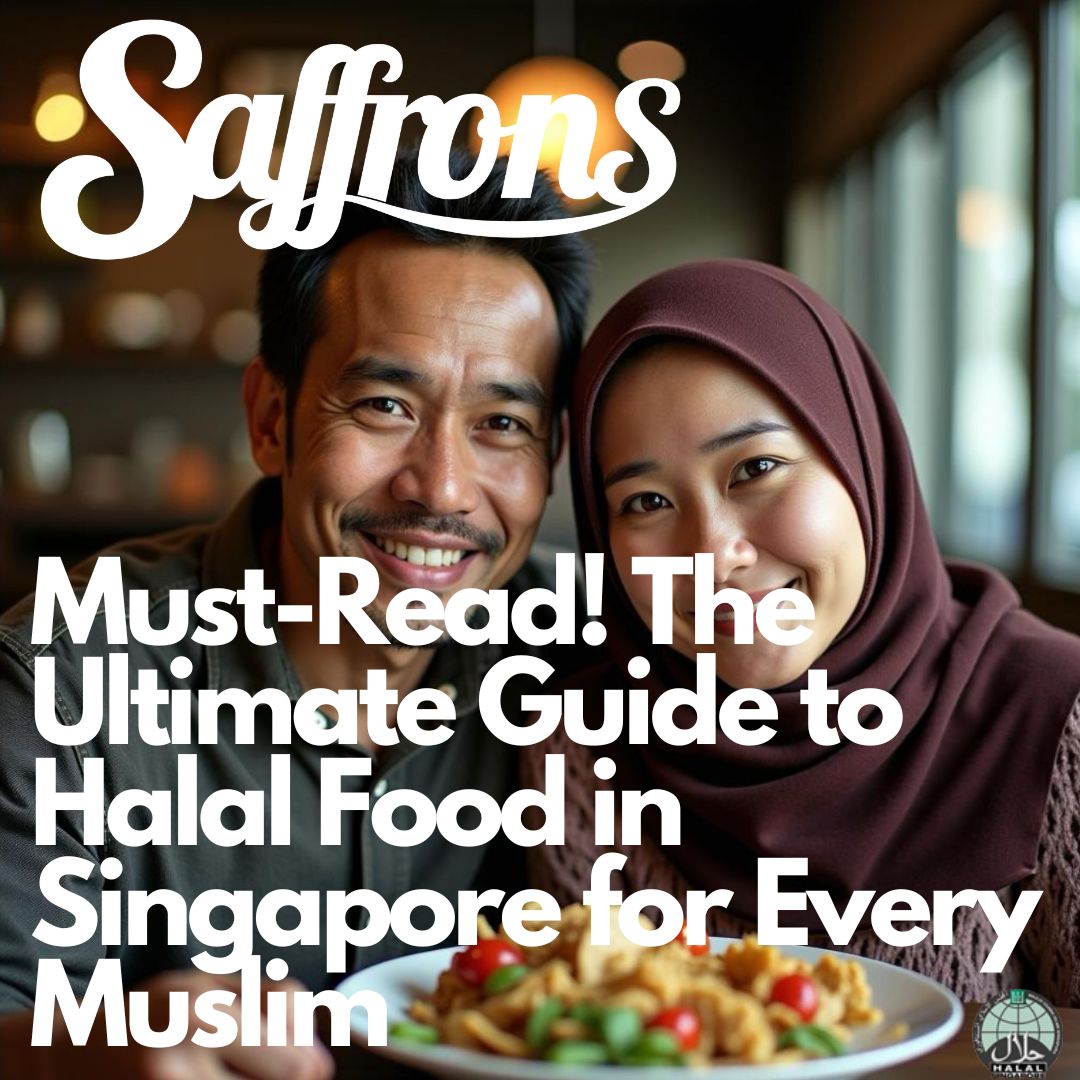
The Evolution of Halal Dining in Singapore: Finding the Perfect Halal Eatery Near Me

Table of Contents

Saffrons Marketing Team
Food Blogger & Catering Specialist
Delivering the finest culinary insights and special event inspiration. With deep experience in the food industry, we are committed to sharing trusted guides on authentic catering and planning your dream wedding.
Share
Halal Eatery Near Me: Singapore's Complete Guide
Discover certified halal dining options in every neighborhood of Singapore
Singapore's halal dining scene has transformed dramatically, creating a vibrant tapestry of culinary experiences that cater to diverse tastes and preferences. The city's commitment to inclusive dining has turned what was once a limited selection into an expansive landscape of halal-certified establishments, making the search for a "halal eatery near me" an exciting culinary adventure.
Halal Eatery Near Me: A Guide to Singapore's Diverse Options
When searching for halal dining options in Singapore, you'll discover an impressive range of choices. From authentic Japanese ramen shops to Korean barbecue restaurants, and even French patisseries, halal-certified versions of international cuisines are readily available. The MUIS halal certification system serves as a reliable guide, ensuring that each establishment maintains strict compliance with Islamic dietary laws while delivering exceptional culinary experiences.
The Transformation of Halal Dining
Singapore's approach to halal certification represents more than just regulatory compliance – it's a bridge between traditional religious requirements and modern gastronomy. This system has enabled restaurants to innovate while maintaining halal integrity, resulting in a dining scene where Muslim diners can explore global flavors without compromising their dietary requirements.
Understanding Halal Standards
The commitment to halal standards in Singapore extends far beyond the basic avoidance of pork and alcohol. It encompasses the entire food preparation journey, from ingredient sourcing to final presentation. Certified establishments maintain dedicated preparation areas, use separate utensils, and ensure their staff receives proper training in halal food handling practices.
A Diverse Culinary Landscape
Today's halal dining options in Singapore span from traditional hawker stalls to sophisticated fine-dining establishments. This diversity reflects Singapore's understanding that halal dining is about creating inclusive spaces where everyone can enjoy quality food together, regardless of their dietary requirements or cultural background.
What Does Halal Food Mean?
Think of halal certification as a comprehensive food safety system that begins long before the food reaches your plate. The word "halal" itself comes from Arabic, meaning "permissible," but in practice, it represents an entire framework of dietary guidelines rooted in Islamic law.
To understand how this works in Singapore's context, imagine following a piece of meat from farm to table. First, the animal must be raised in humane conditions and be among the species permitted in Islam (for example, chicken, cattle, or lamb, but not pork). When it comes time for slaughter, a trained Muslim must perform the process following specific guidelines called Zabiha. This involves saying a prayer (bismillah) and using a swift, precise cut that minimizes the animal's suffering.
But halal compliance doesn't stop at the sourcing of meat. Consider what happens in a restaurant kitchen: Even if all your ingredients are technically halal, preparing them alongside non-halal items could make the final dish non-compliant through cross-contamination. This is why Singapore's halal-certified establishments maintain completely separate preparation areas. Picture two parallel kitchens: one for halal food with its own set of utensils, storage spaces, and even dishwashing facilities.
The Majlis Ugama Islam Singapura (MUIS) oversees this certification process with remarkable thoroughness. When you see their halal symbol at a restaurant, it means they've verified everything from the ingredient suppliers to the kitchen layout to the staff training procedures. It's similar to how health inspectors ensure food safety, but with an additional layer of religious compliance.
This thorough approach explains why Singapore has been so successful in adapting various cuisines to meet halal standards. A Japanese restaurant, for instance, can serve authentic ramen by using halal-certified chicken stock instead of pork-based broth, while maintaining separate preparation areas to prevent any cross-contamination with non-halal ingredients.
How to Verify Halal Certification in Singapore

Planning a halal dining experience in Singapore? Take a crucial first step that seasoned diners always follow: verify the restaurant's halal certification status through MUIS (Majlis Ugama Islam Singapura). You can easily access their official database to check if your chosen restaurant holds a valid certification.
Think of MUIS certification as your quality assurance for authentic halal dining. Unlike informal "halal-friendly" claims, a MUIS certificate guarantees that every aspect of food preparation meets Islamic dietary requirements. This includes everything from ingredient sourcing to kitchen practices and staff training.
Even if you've visited a restaurant before, it's worth noting that halal certificates have expiration dates. Many experienced halal diners make it a habit to perform a quick verification before each visit, ensuring their dining choices remain compliant with their dietary requirements.
By taking this simple step before dining out, you're not only ensuring your meal meets halal standards but also supporting establishments that invest in proper certification. Make this quick check part of your dining routine - it's the smart way to explore Singapore's vibrant halal food scene with complete confidence.
Can Halal Eat Vegetarian Food?

Wondering if vegetarian food is halal? The answer is yes - vegetarian dishes are generally considered halal in Singapore, creating a perfect intersection of dietary choices that benefits both Muslim diners and vegetarians.
Understanding Vegetarian Halal Food
Vegetarian food naturally aligns with halal requirements when prepared without any non-halal ingredients like alcohol-based flavorings or animal-derived additives. This makes most plant-based dishes inherently compatible with Islamic dietary laws. Singapore's halal-certified restaurants understand this connection, offering extensive vegetarian options that meet both dietary preferences.
Why Vegetarian Options at Halal Restaurants Matter
The growing demand for vegetarian halal food has transformed Singapore's dining landscape. Halal restaurants now feature dedicated vegetarian sections on their menus, serving everything from traditional meatless biryanis to innovative plant-based creations. These establishments ensure separate preparation areas to maintain both halal compliance and vegetarian integrity.
Popular Vegetarian Halal Dishes in Singapore
Singapore's halal restaurants excel at creating flavorful vegetarian options. You'll find aromatic vegetable curries, hearty lentil-based dishes, fresh salads, and creative meat alternatives. Many establishments also offer plant-based versions of local favorites, ensuring vegetarians can enjoy Singapore's diverse culinary heritage while adhering to halal standards.
Is Fish and Egg Halal? A Clear Guide to Islamic Dietary Rules
When exploring halal dietary guidelines, fish and eggs hold a special place that's worth understanding thoroughly. Let's examine why these foods are considered halal and how they fit into Islamic dietary practices.
Fish: A Natural Halal Choice
In Islamic dietary law, all seafood is naturally halal - meaning it's permissible to eat without requiring special slaughter methods. This is particularly significant because unlike land animals, fish don't need to undergo the zabiha (Islamic slaughter) process. Think of fish as having a unique status: they're considered pure and permissible straight from the sea, making them an excellent protein choice for halal diets.

Plan Your Dream Wedding
Let us make your special day unforgettable with our premium services
Get Wedding Quote
Ready to Experience Excellence?
Contact us today for premium catering and wedding services
Chat with Us NowMore Articles You Might Like


Best Indian Food Singapore: The Ultimate Guide to Authentic Flavours in 2026
February 05, 2026

Best Indian Restaurants Singapore 2026: Top 18 Halal Options
February 05, 2026

Halal Indian Catering Singapore 2026: MUIS Certified Menu
February 03, 2026

Complete Ramadan 2026 Singapore Guide: Prayer Times & Dates
February 01, 2026

Complete Wedding Planning Guide Singapore 2026 | Saffrons
January 30, 2026
